By: debbie lynn elias
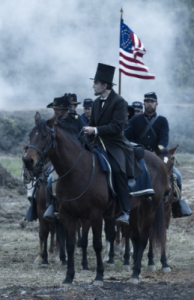
When it comes to history and a Steven Spielberg film, there are several things you can always count on: (1) meticulous research, (2) picture and letter perfect execution of production design and particularly, historical battles, (3) stunning cinematography by Spielberg’s right-hand man Janusz Kaminski, (4) immersive editing by Michael Kahn, and (5) storytelling that goes beyond the traditional, tapping into biographical and historical minutiae that is not only fascinating but absorbing. Such is the case with LINCOLN.
Going beyond the man and his myth, Spielberg taps into the intricacies and machinations of our political system, focusing this story on the precarious manipulations effected by Lincoln himself, and others at his behest, in order to achieve passage of the 13th Amendment to the Constitution, abolishing slavery. The result is one of the finest tellings and examinations of a chapter in American history which has ever been brought to the screen while boding Oscar-worthy, and undoubtedly Oscar-winning, performances from Tommy Lee Jones and quite possibly Daniel Day-Lewis. LINCOLN is the stuff of which history – and movies – is made and in this case, should be mandatory viewing for every elementary and middle school student in America.
Focusing on the waning, but bloody, final months of the Civil War between January 1865 and the war’s ultimate end on April 9, carrying us through the passage of the 13th Amendment and Lincoln’s assassination on, of all days, Good Friday, a mere five days later, we are privy to the battle not on the battlefield of war, but the battlefield of the House of representatives. As contentious as the presidential campaign which our country just endured, with focus on the war between a young radical Republican party with its anti-slavery ideals and the long ensconced anti-abolitionist Democrats, power plays are made, won and lost, personal lobbying takes shape and in intimate moments, we learn something about the men behind the madness of politics.

Well schooled in the superficial background of Abraham Lincoln, Mary Todd Lincoln and their personal losses with the death of their son, thanks to a richly detailed screenplay by Tony Kushner, we see first-hand the marital woes of the Lincolns as they battle Mary’s ongoing depression while she serves as Lincoln’s staunchest advocate. With an ear to the ground, she can manipulate and wield power as well as any man in Congress.
With the bulk of the narrative in conversational styling, we are flies on the wall. So detailed, so perfectly and intimately framed, it is as if we are sitting at the desk with Lincoln and his Secretary of State William Seward as they volley discussion and ideas for ending the war and garnering 20 still needed Democratic votes to achieve passage of the amendment. Themselves at odds with each other as to the feasibility of achieving both goals, if any, there is a ying and yang synergy between the two; a calm methodical Lincoln versus a hot-blooded Seward who is willing to do whatever it takes (with presidential plausible deniability, of course) to move forward in the political process.
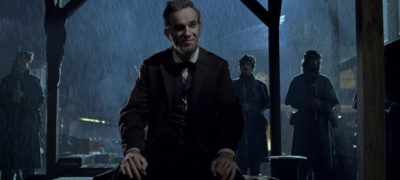
While many of his supporters in Congress believe Lincoln should just acquiesce and settle for ending the war and be content with the 1863 signing of the Emancipation Proclamation and Senate passage of the 13th Amendment, he will not be shaken in his resolve for ending the war and passage by the House before February 1, 1865. Calling on the party’s founder Preston Blair for support, horse-trading of votes is seen in all its glory, particularly when W.N. Bilbo and Robert Latham are called upon to exercise some “persuasive muscle”. While Thaddeus Stevens and Fernando Wood go toe-to-toe with oratory diatribes in the House, Bilbo and Latham are working behind the scenes at the direction of Seward.
Adding to Lincoln’s political trials are Mary’s ongoing complaints as well as parental battles with the Lincoln’s eldest son Robert who quits college, intent on enlisting in the Army and going to battle. Always with down-home charm and anecdotal country lawyer reasoning, Lincoln handles every battle – be they at home, on the battlefield or the political playground – with the comfortable assuredness and calm that made him so beloved to the American people.
And as we count down the days to the House vote and the end of the war, events that will insure Lincoln’s legacy in the history books, someone else is counting down to a day that while extinguishing Lincoln’s life, will only intensify his eternal flame, realizing his ultimate dream – the reunification of a nation.
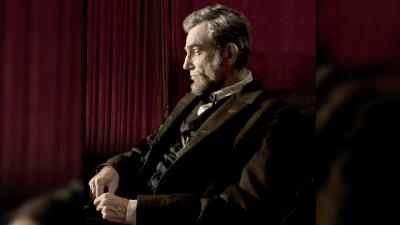
While we have seen many actors portray Abraham Lincoln, including some acclaimed portrayals by Hal Holbrook who here appears as Preston Blair, none has been as captivating as that by Daniel Day-Lewis. Referring to actual evidentiary history as opposed to mythology, Day-Lewis takes the voice up a few octaves from what we have mythologically long believed to be Lincoln’s deeper baritone or bass (since the deeper voice fit the taller man), added some gravelly tonal effects and achieved a quality as distinctive and memorable as is documented was Lincoln’s accurate voice. Assuming a hunched posture and slowed, stilted cadence of movement, Day-Lewis physically articulates the emotional burdens of the war and the times which weighed heavy on the man. Imbuing Lincoln’s known strength of character and approachability, Day-Lewis gives a tour de force performance with a slow burn that bubbles with folksy humor, handily showing why Lincoln was truly a man of the people. Toss in hair, make-up and wardrobe and you feel as it Abe Lincoln himself is walking right off the pages of history into the movie theatre, ready to sit down for a chat.
As Secretary of State William Seward, David Straitharn walks the fine line of loyalty, honesty and presidential protectorate, providing a comfortable but strong balance to Day-Lewis’ Lincoln.
Sadly, although Sally Field gives a fine performance as Mary Todd Lincoln, she feels “too old” for the role of the 47 year old First Lady and vacillates between compelling strength and wishy washy disinterest. Easily filling the roll of Robert Lincoln is Joseph Gordon-Levitt. With a rebellious defiant streak, any parent will sympathize with Mary and Abe at dealing with this headstrong teen.

But the real thrill and excitement of LINCOLN comes courtesy of James Spader and Tommy Lee Jones. Please, let’s just hand Jones the Best Supporting Actor Oscar now who gives a scene-stealing performance as Thaddeus Stevens! With oratory arrogance and aplomb (and clearly relishing the role), Jones electrifies as the nation’s first true champion for full equality. With a booming voice that often borders on pompous and leaning heavily on a cane, you feel the burden of Stevens’ battles, the weight of personal demons, but then Jones’ voice and orations lift you to the heavens and you can’t help but believe in the power of the people. Then there’s Spader. As W.N. Bilbo, the comic relief that he provides with exasperated alcohol-fueled deadpan is rich and delicious. A perfect complement to Bilbo’s shenanigans and coercive methods in obtaining Lincoln’s votes is the Nervous Nellie stylings of Bilbo’s “partner in crime”, Robert Latham, beautifully brought to life by John Hawkes. And let’s not overlook Tim Blake Nelson who, as the third spoke in the Bilbo, Latham, Richard Schell wheel, adds his own texture to the mix while intentionally misdirecting a Confederate peace delegation on its way to Washington, allegedly to meet with Lincoln.
Not to be missed is the youthful exuberance and dynamic that Lee Pace brings to Stevens’ archrival, Fernando Wood. Pace and Jones debating is even more exhilarating that Obama-Romney debate #2.
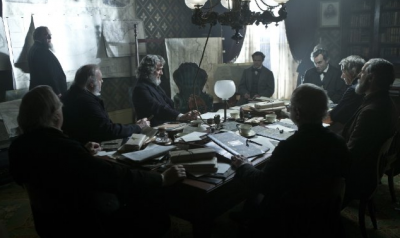
Written by “Munich” scribe Tony Kushner based on Doris Kearns Goodwin’s book, “Team of Rivals”, the script is filled with a multitude of rich historical characters and lush details of a burgeoning democracy. Expertly building to the climactic House vote for the 13th Amendment, emotional and physical action dramatically escalates, buoyed by the all around superb level of performance by the cast. As riveting and engagingly vocative as the interplay of characters is, where LINCOLN pushes the emotional envelope are with Kushner’s moments of quiet that allow for Janusz Kaminski’s perfectly poised portraits of Lincoln’s solitude or the blue, black and grey stillness of death on the battlefield. Lighting is subdued and reflective of the yellowed hues of lanterns and candles with a tonal sheen that embodies both the darkness of the war and the dawn of a new age. Notable is that the story goes beyond the passage of the amendment up through the assassination at Ford’s Theatre. But don’t be looking for a typical recreation or telling of the event. Cleverly written and meticulously edited by Michael Kahn, although we all know the ultimate outcome of LINCOLN’s visit to the theater that night, you can’t help but be taken aback and caught off guard when it happens.
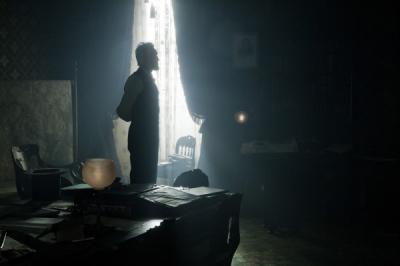
Could the film have ended on a jubilant note with the passage of the 13th Amendment? Most definitely. On the other hand, by continuing the story of ABRAHAM LINCOLN to its foregone conclusion, the film as a whole is elevated to a new emotional level of appreciation and understanding on which the audience is allowed to reflect in those final moments.
Rick Carter’s production design is exemplary as is the period costuming and fabrications of Joanna Johnston. There is nary a button or hairpin that is not period perfect. It is the compilation of each technical element under Spielberg’s watchful eye that make LINCOLN even more than a lesson in history.
Surprisingly refreshing and appropriate is a sumptuous but restrained score by John Williams which I suspect will garner him yet another Oscar nomination.
There is a reason the eternal flame of LINCOLN burns so brightly to this day. Thanks to Steven Spielberg, you can see the legacy, meet the man and “feel” the fabric of history with LINCOLN.
Directed by Steven Spielberg
Written by Tony Kushner based on the book, “Team of Rivals: The Political Genius of Abraham Lincoln” by Doris Kearns Goodwin.
Cast: Daniel Day-Lewis, Sally Field, David Strathairn, Joseph Gordon-Levitt, James Spader, Hal Holbrook, Tommy Lee Jones, John Hawkes, Jackie Earle Haley, Bruce McGill, Tim Blake Nelson, Joseph Cross, Jared Harris, Lee Pace











